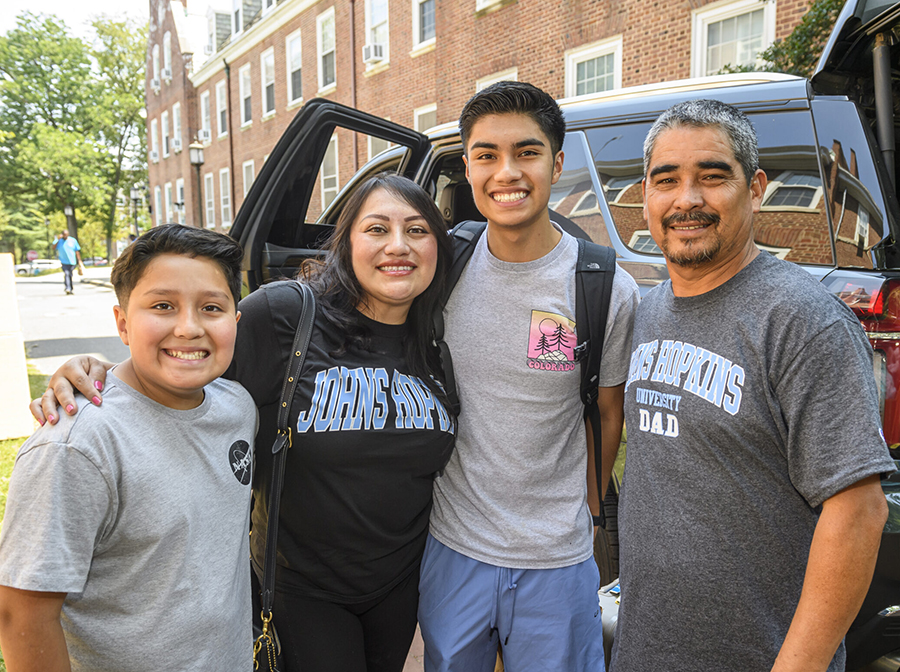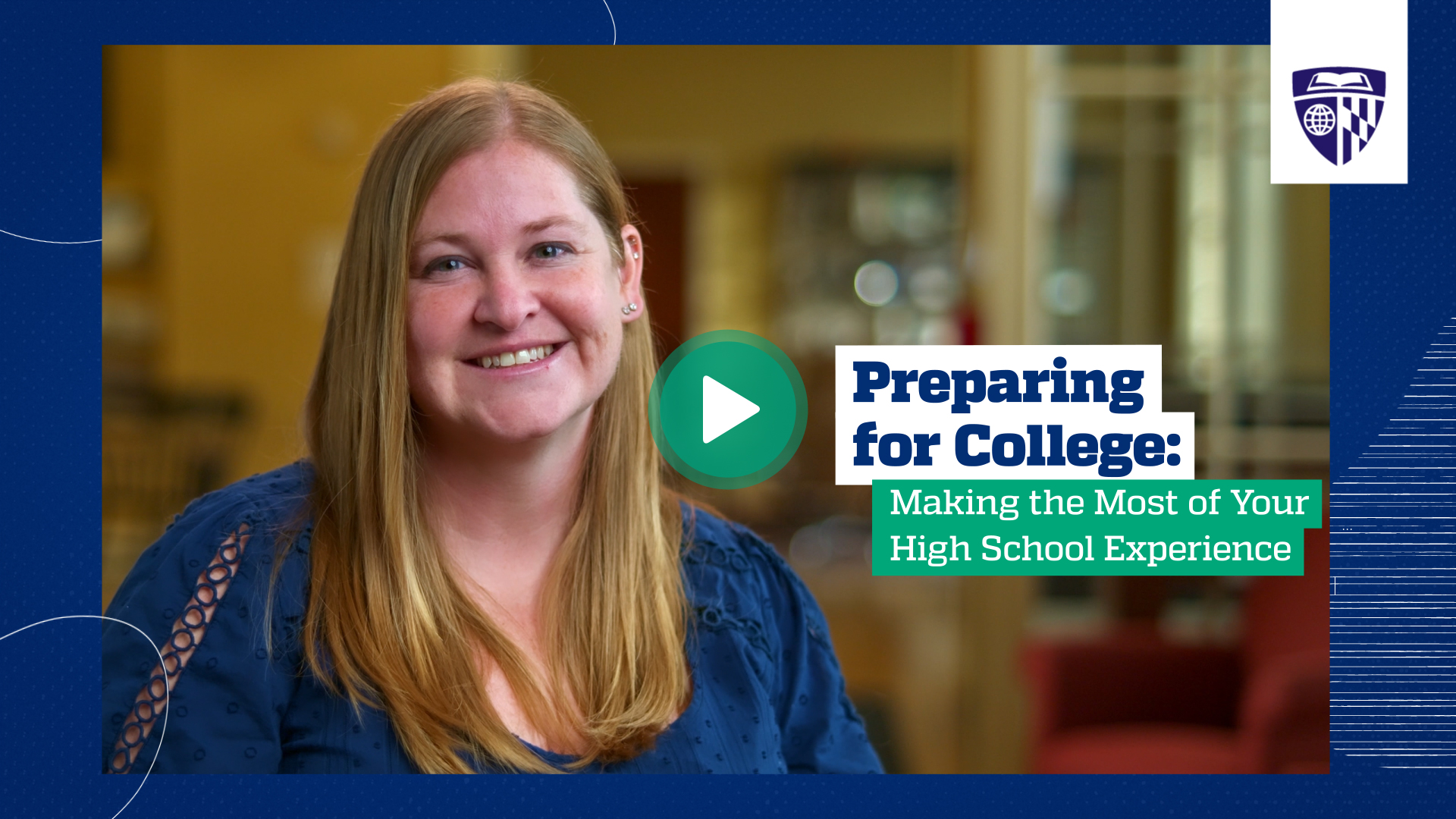Preparing for College

Making the most of your time in high school
The best way to prepare for a college like Hopkins is to pursue things that excite and inspire you while you’re in high school. As we build our community, we look for students who are energized by new ideas, dig deeper into topics that matter to them, and are making an impact in the communities they call home.
Our Senior Director of Admissions offers advice on how to set yourself up for success as a high school student and prepare for the college application process.
Keep in mind, no two journeys to college are alike. That’s why we review applications holistically, meaning we take your personal context—as well as your school’s—into account. This helps us see what opportunities are available to you and how you’ve made the most of them.
When we review applications, we consider three things:
- Academic Character: How you’ve challenged yourself academically and pursued your academic interests.
- Impact & Initiative: How you’ve gotten involved and made an impact in your community.
- Overall Match: How your goals and values align with Hopkins, and how we believe you’d grow and contribute to the university community.
If you’re pursuing a challenging high school curriculum, getting involved in activities outside the classroom, and contributing to your household or local community, you’re well positioned to present a strong application when applying to college. Below, we break down how you can best prepare throughout high school to thrive in a community like ours.
academic character
We consider how you challenge yourself within the opportunities available to you. Academic character shows us what kind of student you are—how do you engage in your classes? Do you work well with others? How have you applied what you’ve learned outside the classroom?
We understand students may have familial or financial responsibilities or other obstacles that limit their ability to pursue their interests after school. The personal areas where you have taken on additional roles, perhaps caring for a sick family member or balancing an after-school job with coursework, still contribute to a strong application.
High School Curriculum
High school course offerings vary around the U.S. and across the world. Because of this, Hopkins does not require any specific courses for a student to be eligible for admission, and we have no preference for any type of curriculum or school. For instance, there is no advantage in our review process in taking an AP class versus IB class or attending a public versus private school.
The most important thing when building your class schedule is to take courses that challenge and excite you.
A broad base of courses will best prepare you for the liberal arts foundation at Hopkins, which consists of the humanities, natural sciences, and social sciences.
We generally recommend taking courses across academic areas. This could include:
- 4 years of English (e.g. courses in literature, poetry, creative writing)
- 4 years of math* (e.g. courses in data science, mathematical modeling, statistics, linear algebra, trigonometry, calculus, and other advanced mathematics classes)
- 4 years of laboratory sciences (e.g. courses in biology, chemistry, computer science, physics, engineering design)
- 4 years of social sciences (e.g. courses in history, macro or microeconomics, government, psychology)
Please note these are not requirements. You may choose to substitute one academic area to double up in another, and that’s perfectly fine!
*If admitted to Hopkins, you’ll have the opportunity to take required math courses, including calculus, if your major requires it.
Enrichment
Our student body is excited about learning, and it shows up in the additional opportunities they seek. Pursuing your interests outside your standard course load—like research,* internships, or taking extra classes—demonstrates self-motivation and how you channel your curiosity.
Some examples of academic enrichment are:
- After-school programs
- Independent projects
- Online courses
- Pre-college classes at a community college or university
- Research or internships
- Summer camps
To find enrichment opportunities:
- Check the websites of your county or state’s department of education or local university.
- Talk with older peers about their experiences.
- Ask your high school counselor to help you identify opportunities that might be best for you.
- Reach out to adult friends or family members who work in fields that interest you.
*High school students are not required to have research experience when applying to Hopkins.
Standardized Tests
Some students choose to take standardized tests like the SATs or ACTs in their junior and senior years of high school. Testing is required to be considered for admission to Hopkins. For more information, check out our standardized testing policy.
If you decide to sign up for standardized tests, you’ll typically take the Preliminary SAT, also known as the PSAT, in the fall of your sophomore and/or junior year of high school. Colleges will not see these scores. Students may choose to enroll in a test-prep service to help them prepare for the official exams, but it’s not necessary.
Tip: CollegeBoard, the organization that facilitates the PSAT and SAT, offers many free online resources, including full-length practice exams. The ACT also offers free test prep like events and online practice.
Summer Programs
How you spend your break from school can tell us a lot about what you prioritize. A summer program is a great way to test out a career path, build relationships with peers who share your interests, and get a preview of college life.
To find summer programs:
- Search online for pre-college programs based on your interests.
- Check your local college or university. You can find information about summer programs at Hopkins here.*
- Use a database like College MatchPoint, Summer Apply, or TeenLife.
*Please note that participation in summer programs at Hopkins does not give an advantage to applicants during the admissions process.
Tip: Find out if your summer program offers financial assistance—some of them do!
IMPACT & INITIATIVE
Our community is made up of students who dig into their interests to make a difference in the world around them. For starters, think about your interests, where you want to make an impact, and how you can contribute to your community. Then, explore them by getting involved outside the classroom.
Your involvement could look like:
- Extracurricular activities
- Family responsibilities
- Hobbies
- Paid work, including part-time jobs
- Summer camps or programs
- Travel
- Volunteering
When it comes to the activities list in your application, we value quality over quantity. There is no minimum number of activities you need to reach, and we have no preference for what type of things you’re involved in. Make sure you participate in hobbies or organizations you enjoy and not because you think it’s what an admissions committee wants to see.
As you spend more time on these activities, look for opportunities to grow within them by mentoring peers, taking on additional responsibilities, or going for a leadership role. Remember, it’s not about the title you hold but the difference you’re making in whichever position you have.
MAKING THE MATCH
Ultimately, you want to enroll in a university where you will succeed in all areas, whether it’s academically or socially. Two key parts of finding the right school for you are understanding what you want out of a college and researching institutions to see if they align with this.
Understand What You Want Out of College
You might not know what you want out of college yet, and that’s okay. It’s also natural for this to evolve as you progress through high school.
A good place to start is considering who you are and who you want to be.
Think about the following questions:
- What excites you now?
- What are your favorite classes and why?
- What’s the most meaningful experience you’ve had so far?
- What kind of college atmosphere are you looking for?
We recommend signing up for our College Search and Application workshop where we discuss more college factors that make for a successful match.
Get to Know Us
Doing your research on schools will help you see if your values align with theirs. When learning about a college, it’s best to do so in more than one way.
Here are some things you can do to get a feel for a university:
- Attend virtual or in-person events
- Speak to current students or alumni
- Learn about financial aid
- Read through student blogs
- Follow the undergraduate admissions office on social media
Tip: Make it a point to visit campus in addition to attending virtual events. Some things just can’t be replicated online! Many schools, including Hopkins, offer travel assistance for certain visit days.
